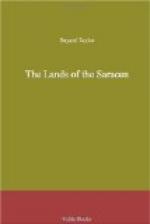nervous shudder. The temperature of the springs
is 180 deg. Fahrenheit, and I suppose the tank
into which he afterwards plunged me must have been
nearly up to the mark. When, at last, I was laid
on the couch, my body was so parboiled that I perspired
at all pores for full an hour—a feeling
too warm and unpleasant at first, but presently merging
into a mood which was wholly rapturous and heavenly.
I was like a soft white cloud, that rests all of a
summer afternoon on the peak of a distant mountain.
I felt the couch on which I lay no more than the cloud
might feel the cliffs on which it lingers so airily.
I saw nothing but peaceful, glorious sights; spaces
of clear blue sky; stretches of quiet lawns; lovely
valleys threaded by the gentlest of streams; azure
lakes, unruffled by a breath; calms far out on mid-ocean,
and Alpine peaks bathed in the flush of an autumnal
sunset. My mind retraced all our journey from
Aleppo, and there was a halo over every spot I had
visited. I dwelt with rapture on the piny hills
of Phrygia, on the gorges of Taurus, on the beechen
solitudes of Olympus. Would to heaven that I might
describe those scenes as I then felt them! All
was revealed to me: the heart of Nature lay bare,
and I read the meaning and knew the inspiration of
her every mood. Then, as my frame grew cooler,
and the fragrant clouds of the narghileh, which had
helped my dreams, diminished, I was like that same
summer cloud, when it feels a gentle breeze and is
lifted above the hills, floating along independent
of Earth, but for its shadow.
Brousa is a very long, straggling place, extending
for three or four miles along the side of the mountain,
but presenting a very picturesque appearance from
every point. The houses are nearly all three stories
high, built of wood and unburnt bricks, and each story
projects over the other, after the manner of German
towns of the Middle Ages. They have not the hanging
balconies which I have found so quaint and pleasing
in Kiutahya. But, especially in the Greek quarter,
many of them are plastered and painted of some bright
color, which gives a gay, cheerful appearance to the
streets. Besides, Brousa is the cleanest Turkish
town I have seen. The mountain streams traverse
most of the streets, and every heavy rain washes them
out thoroughly. The whole city has a brisk, active
air, and the workmen appear both more skilful and
more industrious than in the other parts of Asia Minor.
I noticed a great many workers in copper, iron, and
wood, and an extensive manufactory of shoes and saddles.
Brousa, however, is principally noted for its silks,
which are produced in this valley, and others to the
South and East. The manufactories are near the
city. I looked over some of the fabrics in the
bazaars, but found them nearly all imitations of European
stuffs, woven in mixed silk and cotton, and even more
costly than the silks of Damascus.




